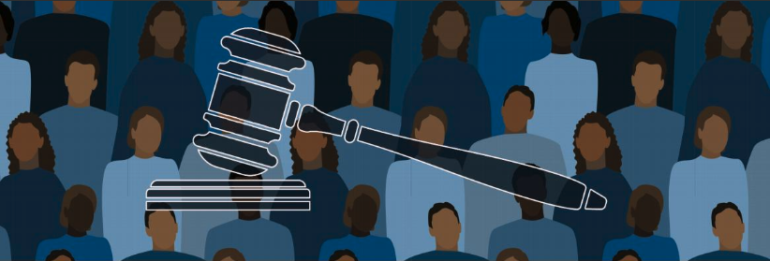
By Euketa Oliver
Once again, citizens find themselves at a crossroad as they are forced to examine their conscience, beliefs, and behaviors surrounding race. Members of the legal community must go a step further, to also examine the ongoing and troubling relationship between the criminal justice system and race.
To begin, one must acknowledge how historically the criminal justice system has been used to systematically instill fear, segregation, and the disenfranchisement of others under the guise of public safety. Throughout time, many laws have disproportionately had a negative impact on people of color. An example of this includes the Jim Crow Laws, a collection of state and local statutes that legalized segregation in areas such as public schools, public places, and public transportation.
Not only have people of color been negatively impacted by these types of laws in everyday activities, this has also shown up in the criminal justice system. It is commonly understood that people arrested and prosecuted are disproportionately people of color. The disproportionality exists from initial police contact through sentencing with African Americans and other people of color being arrested at higher rates, and sentenced to longer prison sentences than their Caucasian counterparts. Throughout history, many African Americans and other people of color often spoke out about the abuse and mistreatment they suffered at the hands of law enforcement and other members of the criminal justice system, but those cries and concerns went unheard. Then came modern technology and the use of cellular phone videos. That technology gave these communities hope because they were finally able to show documented evidence of the abuse and inhumane treatment they experienced. However, the progress of technology was not always a saving grace.
In 1991, Rodney King was brutally beaten on video by four Los Angeles police officers, who would be subsequently charged and acquitted in 1992 despite the videos documenting the unjustified abuse of King. These acquittals were the final straw for a frustrated community who hoped that the video would leave no reasonable doubt that beating was unjustified police conduct. The acquittals exacerbated frustrations stemming from racial and economic disparity, and police brutality. The result: five days of protesting and rioting.
It has been 29 years since Rodney King’s beating, and African Americans continue to be beaten and killed at the hands of police officers. However, this year the killing of George Floyd by police officers, during a time that citizens were emotionally vulnerable because of the COVID-19 pandemic, has served as the catalyst for a shift toward people from all walks of life committed to ensure that actual systemic change is implemented to address systemic racism and discrimination. This shift involves communities having conversations that, although are difficult, are necessary to effectuate change so that everyone can feel safe in their communities and be treated fairly in our world today.
Euketa Oliver is a Deputy Public Defender with the San Diego County Office of the Primary Public Defender, Criminal Defense.